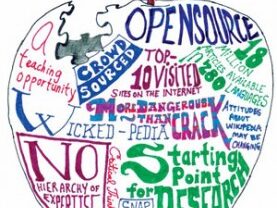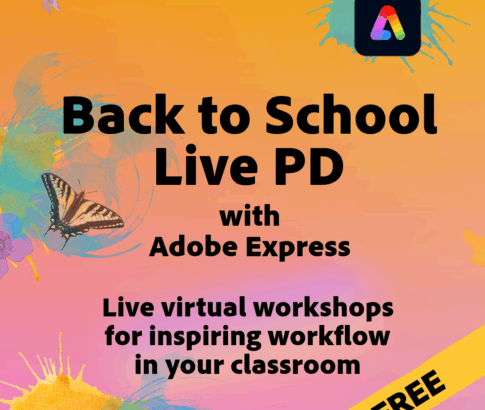Assessment
Resources
“How do I grade it?”
Assessing Student Learning
Teachers who integrate technology into student activities and projects often ask us this question - “How do I grade it?”Fundamentally, assessing multimedia activities and projects is no different than evaluating traditional assignments, such as written essays. The primary distinctions between them are the unique features and divergent possibilities associated with their respective medium. For instance, a blog has a unique set of possibilities (such as hypertext, embedded video, interactive imagery, etc) vastly different than those of a notebook (paper and pen notes and drawings within a contained document).
JOIN US FOR UPCOMING
Asessment Workshops
Building Capacity for 21st Century Learning in Schools
The technology on offer for teachers and learners today can be baffling. The question is: how can schools prepare their teachers so they can succeed in the 21st century? In […]
Nurturing Instructional Change In 21st Century Classrooms
Emerging technologies, a globalized world, and a changing labor market are spurring innovative approaches to district and school curriculum design. Innovative educators are incorporating inquiry-based learning strategies that make meaningful […]
Exploring the Process of Educational Transformation
Technology now permeates almost every sphere of life and has proven transformative in diverse sectors - from marketing and communications to journalism and political campaigning. Technology also offers new opportunities for […]
EdTechTeacher2012 Winter Conference
We are pleased to announce that EdTechTeacher will be bringing together the education technology community for an inaugural EdTechTeacher2012 Winter Conference on March 3-4, 2012, hosted by the Microsoft New […]
Teacher to Teacher Professional Learning
I'm getting ready this week for MassCUE, the annual Massachusetts gather of the EdTech community. It's held at Gillette Stadium, which is a quirky and awesome place to go for […]
EdTechTeacher at MassCue2011
The EdTechTeacher team presented throughout MassCue 2011. Co-Directors, Tom Daccord and Justin Reich, as well as Instructor & Presenter, Greg Kulowiec, hosted several sessions during the event. Tom's presentations at […]
Open Education & Classroom Tools – articles from the EdTechTeacher Team
Justin Reich, Co-Director of EdTechTeacher, just returned from the Open Education conference in Park City. He has posted his thoughts on The Future of Open Educational Resources to his blog, EdTechResearcher. Instructor and […]
The Mobilization of Research
Last spring, Lory Hough from Harvard's Ed Magazine and I swapped emails for several weeks regarding the use of Wikipedia in the classroom. Her final product, Truce Be Told, appeared last […]
CHECK OUT THE LATEST
Assessment Blogs
Announcing the All-New EdTechTeacher Summer Learning Pass!
We are excited to announce the all-new EdTechTeacher Summer Learning Pass for 2023! Educators familiar with our last 20 years of high-quality workshops can now access EVERY workshop held this summer with one low-cost membership of $195. We are conducting 12 amazing workshops over six weeks that consist of three live one-hour webinars and a host of helpful resources.
Back to School with Adobe: Free ETT Virtual Sessions!
Educators are invited to attend exclusive live learning sessions as we celebrate new features in Adobe Express like safe generative AI "text to template" and presentation capabilities. Together, we'll learn new tools and share project ideas to launch your students' success. Whether you're new to Adobe Express or a major fan, these sessions guarantee new learnings that will supercharge your students' creativity. Join EdTechTeacher for live PD and exciting project ideas for your classroom and students!
The first thing to realize is that you cannot separate the user from the device. iPads, Chromebooks, and tech tools themselves don’t demonstrate great learning; it’s about what students do with the technology that matters. The technology itself is simply neutral. Consider: would a teacher grade the pen a student used to write an essay? Of course not! They grade what the student writes. It’s what students create with the tool that is at the heart of learning and assessment.Formative vs. Summative AssessmentPerformance is most often analyzed through formative and summative assessment. Formative assessment is ongoing and provides information needed to adjust teaching and learning for a more effective outcome. It not only helps to monitor student progress throughout an activity, but can also gauge student understanding and readiness to proceed to further tasks. Alternately, summative assessment focuses on a particular point in time, such as a test at the end of a unit or grading term.Regardless, whether the immediate assessment is formative or summative, a teacher needs to be able to distinguish between the capabilities of the tool and the students’ performance using it. To illustrate, anyone can easily produce a visually stunning and captivating video presentation using iMovie as it has built-in easy-to-use professional effects. Therefore, to assess a movie presentation effectively, the teacher needs evidence of the thinking that went into the creation of the movie. Rather than grade the end product, educators must focus on the process -- research, writing, image selection, etc.
This allows teachers to focus on learning throughout the whole project rather than the flashy, finished product.
Rubrics to Measure Student Learning
Providing detailed explanations of an assignment using an online rubric, created with tools such as Rubistar or Digital Media Scoring Guides, can assist students in both completing tasks and thinking about their performance. Additionally, these tools allow teachers to create rubrics for assessment quickly with a greater level of meaningful feedback. They can also easily be shared among teachers and saved or modified for future assignments.






